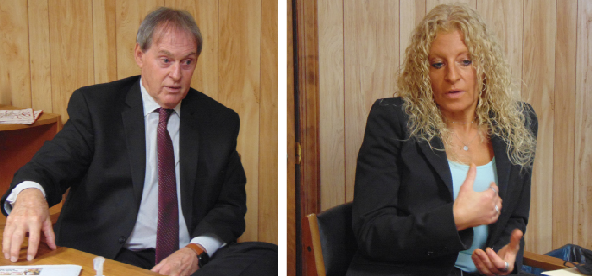Smithtown supervisor candidates square off over new developments

Development in the Town of Smithtown is on the top of town supervisor candidates’ minds on the way to election day Nov. 2. Incumbent Supervisor Ed Wehrheim (R) lauds his and board members’ efforts to revitalize downtowns and sewer infrastructure. Meanwhile, his challenger, local attorney and Democrat Maria Scheuring, said she is concerned about overdevelopment.
Wehrheim has spent nearly 50 years in town government, working through the ranks of the town parks department from 1972 until he was appointed department director in 1989. He retired from that position in 2003 when he was elected to the Town Council. Wehrheim was put forward as the Republican frontrunner for supervisor in 2017, ahead of previous supervisor Patrick Vecchio, who had been in the position for close to four decades. Wehrheim won the close primary and went on to handily win his supervisor seat that November.

Scheuring grew up in the Bronx, where she worked in the Bronx D.A.’s office before moving to Smithtown in 2006. She currently has a private practice dealing in matters from guardianship to visiting clients in nursing homes to looking over music contracts. A musician herself, she is also the executive director of Alive After Five festival in Patchogue, where she said her frequent attendance of village meetings has given her insight into the struggles of local government.
During an in-house debate in TBR News Media’s offices, Scheuring said she was concerned with the number of empty storefronts in Smithtown, especially due to the pandemic. She said she counted around 25 empty buildings along West Main Street from Katie’s bar to Route 111. She would propose making a director of industry a full-time position to work with the community and “only find appropriate stores, or restaurants or businesses that could be put in those empty storefronts, but not taking away from the current businesses that are there.” She also proposed taking the empty bowling alley located near the Smithtown train station and turning it into a youth and community center.
Wehrheim said COVID-19 had an impact on all three of Smithtown’s main small business districts, in the St. James, Smithtown and Kings Park hamlets, though the vacancy rate among all three remains 12%. He defended the town’s response to the pandemic, saying Smithtown instituted a three-day turnaround outdoor dining permit, which around 80 restaurants and bars took advantage of. That permit and permit process had been extended into the current year. The town took its audio/visual staff, which work out of the code and safety office, and created lengthy videos about how each business was adjusting to COVID measures, which were published on the town app and social media.
Still, Scheuring said she is most concerned about new development, especially new apartments along Smithtown’s main streets. She said her old Bronx neighborhood in Throgs Neck was being slowly transformed from single family homes into apartment complexes. She said she doesn’t see how the town is prepared for new incoming residents, whether it’s the impact on schools or traffic. She pointed to Babylon and Sayville that have “thriving main streets” without apartment buildings.
“I think a lot of people feel that way,” she said. “I don’t think that they are happy that there’s an apartment complex going up right on [Smithtown’s] Main Street. The traffic is bad enough, it’s going to cause more traffic.”
She added that she was further concerned with the price of some of these apartments, that they are overpriced for single people and that many who move in “don’t have roots, they don’t intend to put roots in this community necessarily.” Scheuring further asked why the town instead doesn’t focus on building townhouses, such as those in Patchogue.
The current supervisor said that Smithtown has changed drastically from when he was a young man, when most of the town was farmland. Now, “that ship has sailed.” He argued that most experts agree that the way to save main streets is to have constant foot traffic within the downtowns, and that requires apartments, and especially mixed-use buildings with living space above and commercial space below. He added these apartments are important for keeping both young and old on Long Island, but residential neighborhoods will not suddenly start seeing apartment complexes going up on their blocks.
“We have beautiful residential communities in the Town of Smithtown — they will never be hampered or affected by what we do,” Wehrheim said. “We do it in commercial areas. Some of the developments that some folks have talked about … they’re developments that we’re doing in blighted areas.”
The other big controversial topic within the town, especially the North Shore communities, remains the proposed Gyrodyne development on the Flowerfield property in St. James, especially plans for a sewage treatment plant on the property.

Wehrheim said that now the renovations on Lake Avenue in St. James are complete, including underground sewer infrastructure, the town would be able to connect to a sewage treatment plant, either to the north, at Gyrodyne, but if not then also east or south. Similarly, with plans to renovate Kings Park business district in a similar way, state approval for a sewage treatment plant on the old Kings Park Psychiatric Center property is a huge boon for residents in that area.
Water quality and the health of coastal bays remains top priority, Wehrheim said. He cited the town’s recent acquisition of the Oasis gentlemen’s club through eminent domain in order to protect the head of the Nissequogue River.
As far as Gyrodyne is concerned, he said the only action currently happening is the Smithtown Planning Board will be making a decision on an eight-lot subdivision of the Flowerfield property, “then the Town Board will have an opportunity to work with the principals of their property on what is going in there. We will look at it as a Town Board, if and when the subdivision is done, and then we will control what gets developed there through our planning professionals and our environmental professionals on that site.”
Scheuring said it has been hard for the community to understand what is currently happening with the Gyrodyne development, and that at meetings and other community gatherings, people “are saying they just didn’t want that, they want green space, they don’t want overdevelopment — the traffic is already bad on 25A.”
She went on to say “there is no information about the latest plans for this town,” regarding this or other developments. Wehrheim countered that the town does regular updates on its website and now has an app for residents to get up-to-date info on their phones. Meetings are also livestreamed and accessible to the general public.
Overall, Scheuring said, as a Smithtown resident and mother of three, she represents a good portion of the community, and she would like to focus on the use of properties to maintain the town’s character.
“As a member of this community, I feel passionate about these things, because this is my family,” she said.
Wehrheim said his track record speaks for itself, and if elected he would continue with parks and downtowns revitalization efforts, as well as keeping an open and transparent town hall. “The fact that it’s been my career, and I love doing it, bodes well for me to continue to serve the Smithtown public,” he said.






